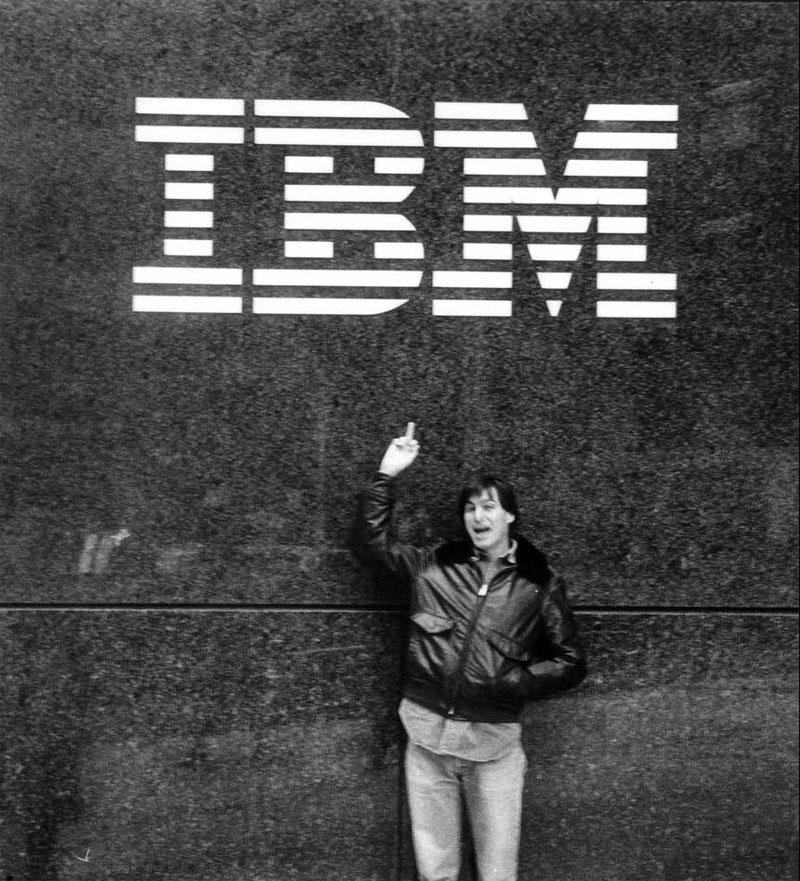Curse of culture
Microsoft's blindness. Warning Signs for Google and Apple
In one of the fundamental books on this topic “ Organizational Culture and Leadership ” Edgar Shane writes:
“The most intriguing aspect of culture as a concept is, perhaps, the fact that it points us to phenomena that lie deep, powerful in their effects, but invisible and largely unconscious. In this sense, a culture for a group is the same as a person or character for a person. We can observe the resulting behavior, but often do not see the forces causing this behavior. As our personality and character direct and constrain our behavior, so culture directs and constrains the behavior of group members, and is carried out through the collective norms inherent in this group. ”
In Shane's terminology, things like table tennis tables and beer fridges are two (small) examples of artifacts — the visible qualities of an organization. They are easy to see, but their meaning usually defies decipherment and is unique to a particular group (in other words, simply copying Google chips does not work).
At the next level - the proclaimed beliefs and values that each member of the group understands on a conscious level: for example, “openness” or “customer is always right”. As you can guess, accepted beliefs and values quickly become clichés.

')
The most important, in fact, is the third level: basic foundational concepts. Shane writes:
“According to my concept, the basic ideas are presented to the members of the group so obvious that the variation of behavior within a given cultural unit is minimized. In fact, if a group adheres to some basic idea, then the behavior, which is based on any other ideas, will seem incomprehensible to the group members. ”
Such a definition has profound implications. Culture is not something that creates success, but, on the contrary, it is a product of success. All companies begin with the proclaimed beliefs and values of their founders, but as long as these beliefs and values have not proven their correctness and success, they are open to discussion and change. However, if they lead to real stable success, then these beliefs and values move from a conscious level to an unconscious. It is this transformation that allows the company to retain that “secret ingredient” of initial success, even when scaling a business. The founders no longer need to instill their convictions and values to a 10,000th employee; every one of the company's employees already adheres to them in each of their decisions, big or small.
Microsoft Blindness
Like many such things, culture is one of the most valuable assets of a company until it begins to interfere: the same basic values that helped an organization grow on a large scale prevent the same organization from changing the direction of development. Worse, culture alone does not allow organizations to even understand what they need to change. Here is what Shane writes:
“Basic concepts, like the usual theories, do not cause us objections or doubts, and therefore changing them is extremely difficult. In order to master something new in this area, it is necessary to resurrect, recheck, and possibly change some of the most stable elements of our cognitive structure ... Such training is extremely difficult, since re-checking basic concepts for some time destabilizes our cognitive space and interpersonal space. causing a lot of anxiety. We do not like to be alarmed and therefore we prefer to believe that what is happening corresponds to our ideas, even in those cases when it leads to its distorted, contradictory and falsified perception and interpretation. In psychological processes, this kind of culture acquires special strength. ”
Probably the Microsoft canonical example of this way of thinking was after the release of the iPhone. Now it has already been forgotten, but no company has come close to the level of monopoly that Microsoft had in the computer industry from about 1985 to 2005. (Yes, Apple ended up making a lot more profit than Microsoft in its history, and Google came close , but they both did it in a much larger market). The company has set bold goals: “A computer is on every desk and in every home, with Microsoft software” - which it has managed to achieve and surpass: it has also captured work offices. This unprecedented success turned the goal, which was initially proclaimed as a value, into an undeniable belief that all computers must, of course, work on Microsoft programs. Given this, it would be a real shock if Steve Ballmer had not ridiculed the iPhone .
500 dollars for a phone ???
After a year and a half, Microsoft realized that its operating system for Windows Mobile smartphones could not compete with the iPhone, and work began on what would later be called Windows Phone. However, the underlying cultural assumptions remain the same. The first assumption is that Microsoft has time and unlimited resources to release something worse at first, but ultimately the best is inevitable. Secondly, what company can use to dominate the pressure of Windows and Office. Both of these assumptions cemented into the company's culture after Microsoft won the browser war and in the process of their systematic capture of corporate data centers. In reality, Microsoft’s attempts to launch a successful mobile device were doomed to failure initially, and everyone understood this before Windows Phone came along with its funeral procession for the iPhone .

Funeral procession for iPhone, September 2010
Steve Ballmer never understood that. His last steps were a reorganization of the company with the strategy of “One Microsoft”, which was focused on Windows, and the purchase of Nokia to support Windows Phone. He gave way to Satya Nadelle, his successor, to engage in cultural change, and that is why his first public appearance, in which he presented Office for iPad, was so important. I wrote at the time :
“This is the power that executive directors have. They cannot do all the work, they cannot influence the trends of the industry that are beyond their control. But they can make a choice: to accept reality or not, and by accepting it, to influence the worldview of all their employees. ”
Microsoft managed by Nadella over the past three years has made tremendous transformations by accepting its fate as a platform-independent service provider. But it is still trying to catch up with Amazon in the cloud services market, trying to catch up with open source tools and overcome the fact that mobile users have been used to doing without Microsoft software for six years. How much stronger would the company be if it accepted reality in 2007, but culture made it impossible.
Steve Jobs Leadership
Shane defines leadership in a cultural context:
“If you carefully study the culture and leadership, then you can see that these are two sides of the same coin; they cannot be understood separately from each other. On the one hand, cultural norms determine how a given nation or organization will determine leadership — who will be promoted to the post, who will receive public support. On the other hand, it can be said that the leader’s only important task is to create and manage a culture, that the unique talent of the leaders lies in their ability to understand and work with the culture; and that the leader’s unique prerogative is to destroy a culture that he considers dysfunctional. ”
A great example of this kind of destruction was the speech of Steve Jobs as the company's temporary executive director at the 1997 Boston Macworld , especially the shocking announcement of Apple's partnership with Microsoft.
When Jobs uttered the word “Microsoft“, the audience gasped distinctly. A few minutes later, when Jobs clicked on the slide, where Internet Explorer was called the default Macintosh browser, the audience began to buzz so loudly that Jobs had to interrupt the speech. When Jobs finally uttered these words "default browser", the audience buzzed even louder, and even some exclaimed "No!". This, in the context of today's Apple presentations, looks shocking.
Then, after Bill Gates addressed the audience via satellite communication (which Jobs would later call “his worst and stupidest performance in history”), Jobs began a speech his biographer Walter Isaacson would call an “improvised lecture”:
“If we want to move forward and see Apple get back on its feet, we have to make some concessions. We must abandon the formula that winning Microsoft means defeating Apple. Okay? We have to accept that if Apple wants to win, that Apple needs to do a lot of work, and if others are going to help us, that's great, because we need any help. And if we get the job done and don't do a good job, it's not someone's fault. So I think this is a very important perspective.
In my opinion, if we want to get Microsoft Office for Macintosh, we have to treat the company that does it with some gratitude. We like their programs. So the era of competition between Apple and Microsoft is over, as far as I can tell. It's about rehab and how Apple can make an incredibly valuable contribution to the industry in order to become healthy and prosperous again. ”
Here is what Shane writes:
“But when a group is faced with the difficulties of adaptation, when the environment changes to such an extent that the declared values no longer work, leadership is even more important. Leadership now provides an opportunity to go beyond the culture that created the leader and begin the processes of evolutionary change that are better suited for adaptation. This ability to sense the limitations of one’s own culture and to adapt one’s culture is the essence and ultimate task of leadership. ”
There is no doubt: although Steve Jobs was absent at the helm of the company for more than a decade, it was he who caused that hum in the audience.

Jobs gave Apple in general and Macintosh in particular the degree of absolute uniqueness and superiority over competitors, especially over the hated IBM PC and its Windows operating system (originally DOS). However, by 1997, Microsoft won, and Apple struggled for survival. Still, the audience booed that rescue rope that the companies threw! This is the kind of power that culture can carry - and this is why Jobs’s “improvised preaching” was so necessary and so powerful. It was the Apple version of Office for iPad, and a great example of leadership.
Warning Signs for Google and Apple
Last weekend, Marco Arment wrote a widely discussed essay " If Google is right about AI, then this is a problem for Apple ":
“The success of the BlackBerry came to an end not because RIM began to produce worse-quality smartphones, but because the new role of smartphones went almost completely beyond their capabilities, and it was already too late to catch up. RIM hasn’t spent several years building a world-class operating system, it didn’t have a large team of great designers or experience in mass production of luxury-class consumer electronics, or stunning APIs, or development tools, or an application directory with millions of users already queuing up with credit cards in hand, or all the major assets Apple has accumulated over the decade (or longer) that are associated with the iPhone. No new initiatives, management changes or acquisitions would save the BlackBerry in 2007. It was too late and the gulf was too big.
Today, Amazon, Facebook and Google are investing heavily in Artificial Intelligence, ubiquitous digital assistants and voice interfaces, hoping that this will be the next major breakthrough in the mobile device market. If they are right - and this is a big “if” - I’m worried about Apple ... If the landscape changes so that these AI services with big data become important, then Apple will find itself in the same position as BlackBerry almost a decade ago: what they can do, even in the best possible form, will no longer be enough, and they simply cannot catch up with the competitors. ”
Arment is completely right. However, the most interesting thing is that Google has its own set of problems : users actually spend time in social applications that are mainly controlled by Facebook, and although Google is a critical asset of Android, its most valuable users (in terms of monetization) sit on iOS . How will users actually access Google’s AI capabilities (if there is one) and how does Google monetize them?
Of course, none of the companies at the moment is in a quandary. Maybe Apple for the first time in 13 years has not shown record figures , but their income is $ 50.6 billion in the second quarter. 2016 is more than the total revenue of Microsoft, Google and Facebook combined. At the same time, Google again updated the historical record of quarterly profit: $ 17.3 billion.
However, there is a problem: after all, BlackBerry was not in a difficult situation either in 2006, like Microsoft in 2007, and even Apple in 1993. There was no obvious reason to suspect anything amiss, and it was culture that ensured that any hints would be ignored. Shane again:
“Culture as a set of basic ideas determines what we should pay attention to, what is the meaning of certain objects and phenomena, what should be an emotional reaction to what is happening, what actions should be taken in a given situation. Having developed an integrated system of such representations, which can be called a world map, mental map, cognitive map of the world, we will experience comfort next to people who share our world view, and obvious discomfort in situations where a different system of ideas will work, since we will not to understand what is happening or, even worse, we will distort the actions of other people and give them a false interpretation. ”
So BlackBerry thought Apple was lying about the iPhone ; Steve Ballmer was convinced of the loyalty of the Microsoft course, and Apple itself decided, in terms of Jobs, to donate a product for the sake of profits. The time for action was a moment of denial, not a moment of crisis.
The way forward
Nevertheless, both Apple and Google are still in a position of significant strength to move forward: iPhone sales growth has peaked or not , but this source will not disappear anywhere, and the company is almost certainly already working on the car . At the same time, Google is even in better shape: the company firmly holds leading positions in machine learning, which can result in a variety of interesting applications, and Android positions look great.
However, there are very obvious steps that both companies can take to consolidate their strengths.
- Apple can enter into an alliance with a company like Microsoft (again) to build a layer of services both in the backend (Azure) and in the frontend, if you approach the issue radically (a combination of Siri and Cortana). The most radical solution is to fully open iOS, so that users can install Google services (or any other) by default. This eliminates any medium-term threats for the iPhone from the Android functionality, which is closely tied to the capabilities of Google’s AI (these are problems in the long run).
- Google can - must! - create bot for Facebook Messenger. Moreover, it should create a full-fledged backend for Facebook Messenger developers. People want to live on Facebook? Great, we'll meet there, just like Google found its users on the Windows operating system through its browser.
These ideas (of course, there are others) are not without flaws: Apple is depriving itself of the future as a service provider, but honestly, I am extremely skeptical about the possibility of such a future in any case. The company has not only an irregular organizational structure , similar to Microsoft, but the staggering success of the company has had a lasting impact on its culture; in this case, the company is so focused on the production of physical products that it is generally difficult to imagine that there will be an effective mentality regarding the provision of services, without mentioning even the company's inherent (and sometimes hypocritical) absolutism regarding privacy .
At the same time, for Google, the proposed idea means competitor support. After all, Google and Facebook have the same customers as advertisers — and although it’s unclear how Google can get the audience back, it’s still not obvious that it should help a competitor.
Curse of culture
The biggest challenge for both companies is culture. Apple is the strongest - and also because of the humiliation of the 1997 speech - desires total control. Google, for its part, wants information and cannot accept the idea that Facebook will have more of it.
The rigidity of the position in both cases is a manifestation of the disease peculiar to each great company: confidence that the methods that worked before will be as effective in the future, even if circumstances change. What makes a company great, inevitably becomes the cause of its failure, sooner or later.
Source: https://habr.com/ru/post/302008/
All Articles